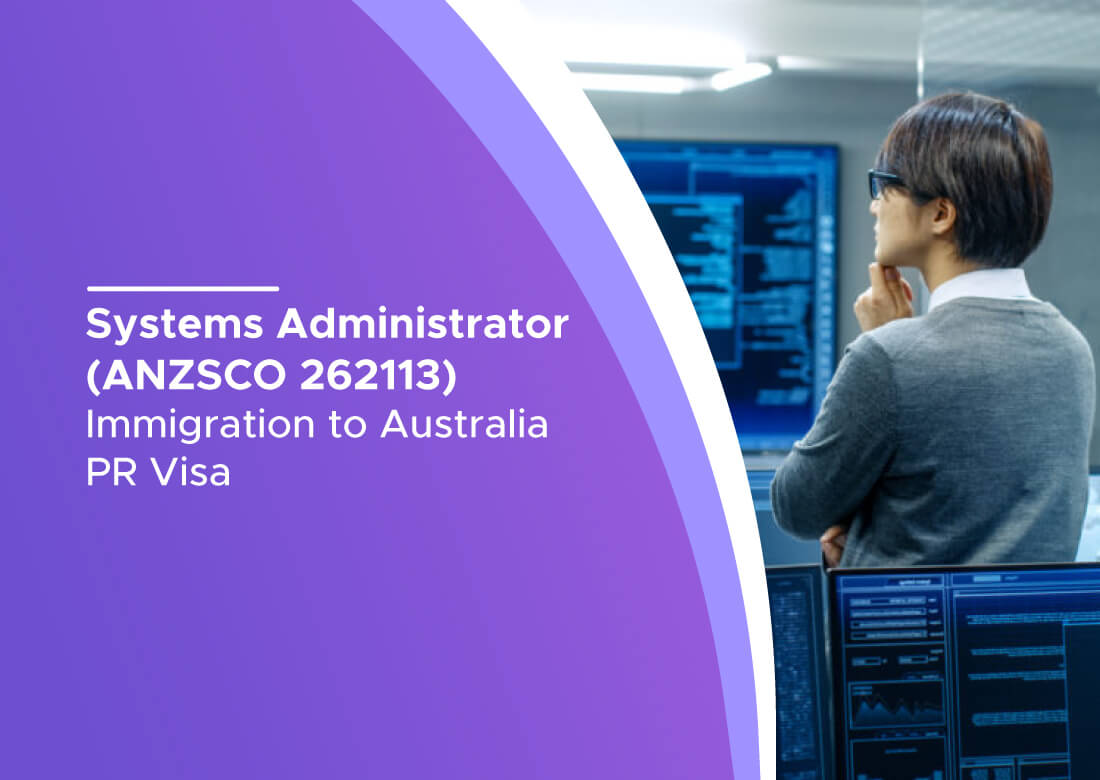Systems Administrator ANZSCO 262113 Immigration to Australia PR Visa

Systems Administrator Job Details
Analyst Programmer anzsco 261311 analyses the needs, requirements of the client to provide a systematic presentation of the plans, documentation, etc to encode, test, maintain the application programs.
Skill Requirement
Skill Level: Level 1 or Equivalent
Skills Assessment Authority: ACS (Australian Computer Society)
Alternative Titles: Systems Manager
Occupation list information
| Occupation on the skill list | Occupation not on the skill list |
|---|---|
| Combined Skilled Occupations List (STSOL MLTSSL) | Labor Market Testing Required for 457 List (LMTL) |
| Short-Term Skilled Occupation List (STSOL) | Medium Long Term Strategic Skills List (MLTSSL) |
| Labor Market Testing Required for 457 List (LMTL) |
Visa Provision
Candidates for Systems Administrator can apply for Skilled Nominated 190 visa or Skilled Regional Nominated 489 visa that features the Short-term skilled occupation (STSOL) list. If you are working in this occupation and you want to qualify for a General Skilled Migration visa, you would be forced to apply for a state appointment in order to travel to Australia.
Although this occupation is listed on the STSOL, there is also a chance that no country actually has a market for people in that profession. The online assessment only lists occupations that are actually being requested by a state or territory in Australia, so if the occupation does not appear on the online assessment, you can consider finding an employer sponsor in Australia.
Unit Group: 2621 Database and Systems Administrators, and ICT Security Specialist
Occupations in this Category
Skill Requirement
Most of the occupations in this unit group have a skill level that is commensurate with a bachelor’s degree or higher qualification. A formal qualification may be substituted for at least five years of relevant experience and/or vendor certification. In some cases, in addition to the formal qualification, relevant experience and/or on-the-job training may be required (ANZSCO Skill Level 1).
What do Systems Administrators do?
Systems Administrators track the system and model new computer systems and server quality. They are also responsible for downloading and configuring applications and hardware, maintaining network servers and technology resources, setting up accounts and workstations.
Task
1. Developing and managing database infrastructure, data structures, tables, dictionaries and naming conventions to ensure the consistency and completeness of all master data files.
2. Operational establishment and preventive maintenance of copies, recovery protocols and implementation of confidentiality and reputation controls
3. Implementation and management of database documentation, protocols, policies and procedures
4. Testing database systems and improvements, such as debugging, recording, replication, logging and fixing all detected bugs, according to authorized standard testing scripts, procedures and processes.
5. Responsibility for operations, protocols and organizational control related to system security and disaster recovery planning
6. Liaising with security vendors, manufacturers, equipment providers and external resources; reviewing, recommending, deploying and managing information security applications; and tracking contractual commitments, performance and service level agreements
7. Troubleshooting and delivering service assistance for the detection, resolution and restoration of server-related hardware and software malfunctions, including workstations and networking networks
8. Preparing and managing documents, policies and orders, and documenting and describing operating processes and system logs
9. Ensure that the architecture of computer sites requires all parts to come together and function correctly, and track and change the performance of networks;
10. Continuously survey the existing computer site to identify potential network demands and to make suggestions for progress in the deployment of future servers and networks.
English Requirement
1. IELTS score of minimum 6 (L, R, W), 7 in speaking and 7 overall;
2. OET score with a minimum grade B in all sections;
3. TOEFL iBT with a minimum score (L:12, R:13, W:21, S:23 and overall L93);
4. PTE Academic with a minimum score of 50 (L, R, W), 65 in speaking and 65 overall
Exceptions
- In some states/territories, Australian Graduate exceptions exist.
- Priority Skilled Lists can apply a specific requirement in some states/territories.
Countries excluded from submitting IELTS or OET shall include the United Kingdom; Canada; New Zealand; the United States; and Ireland.
Where compulsory licensing or registration is required you must demonstrate a level of English that is either adequate to satisfy the licensing/registration criteria or a minimum IELTS or equivalent level, whichever is higher.
• Backup and Recovery
• Data Encryption
• Database design
• Database implementation
• Database Management Systems – (Relational Database, Object Oriented Database, RDBMS)
• Information Systems security
• Internet and the Web
• Operating systems – (Unix, Linux, Xenix, Network OS)
• Server related hardware and software
• System Administration
• Systems Management
• Systems Programming
• Web security
• Client Server Technology
• Computer Networks
• Critical Path Method
• Data policy
• Data security
• Distributed Systems
• File Processing
• Introduction to ICT – (Introduction to Computer Science, Computer Theory, Introduction to Business Computing, Computer Science I)
• Project Management
• Quality management – (Quality Assurance, Software Quality)
• Testing strategies and methods
